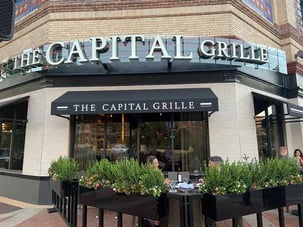3 min read
How ESOP Companies — and Their Employees — Win Together
Dialectic Engineering
Oct 11, 2021 4:00:42 AM

It’s Employee Ownership Month, a celebration to bring awareness to the benefits that employee ownership provides to companies and their employees across the country.
In the spirit of celebrating employee ownership this October and year-round, we sat down with Dialectic’s Director of HR, Alex Martin, to talk through the benefits of the Employee Stock Ownership Plan (ESOP) model, from recruiting talent to company culture and tax benefits.
How does an ESOP work?
 With the ESOP model, a company creates a trust fund (a Qualified Retirement Plan) into which it contributes new shares of stock or cash to buy existing shares. To put it more simply: Each employee maintains an account representing an ownership stake within a company. In most ESOPs, the number and value of shares in the plan increase the longer you work there, ultimately incentivizing lower turnover and higher morale.
With the ESOP model, a company creates a trust fund (a Qualified Retirement Plan) into which it contributes new shares of stock or cash to buy existing shares. To put it more simply: Each employee maintains an account representing an ownership stake within a company. In most ESOPs, the number and value of shares in the plan increase the longer you work there, ultimately incentivizing lower turnover and higher morale.
“Whether you’re with us ten years or until you retire, you take that value with you when you leave,” Martin said. “You don’t pay for that stock with dollars from your paycheck, but rather from the sweat equity of employment, and the company will buy that stock back from you whenever you exit the company.”
The benefits of an ESOP
Focus on teamwork and employee well-being
In an ESOP model, the good of the business reflects the good of each individual employee due to a shared stake. This ultimately creates a “win together, lose together” mentality that emphasizes collaboration and teamwork — tenets that not only improve morale and company culture, but also have a tangible effect on company performance.
“Our responsibility is to act in the best interest of employees,” Martin said. “When we make decisions, we’re looking to honor that social contract and whatever best benefits the ESOP as a whole. It keeps our mission very focused.”
Increased productivity and trust = lower turnover
With the long-term incentive that an ESOP provides, employees are more likely to work harder in the best interest of the business.
The benefits of working within an ESOP are best reaped the longer you’re with a company, which ultimately leads to drastically lower turnover rates, higher company loyalty and increased trust within the business.
A 2020 study by the Employee Ownership Foundation found that ESOPs were between three and four times more likely to retain staff at all levels during the 2020 shift to work-from-home, as well as significantly less likely to reduce employee hours and pay.
“An ESOP puts ownership in the hands of those who may not otherwise have it,” Martin said. “When you own something and can buy into it, you take better care of it. The level of engagement within ESOPs is much higher than in other organizations because employees physically own the business.”
Attracting top talent
As an HR director, Martin has witnessed firsthand the benefits of the ESOP model in drawing and retaining talent. The benefits of it are an easy sell to new recruits, as an ESOP offers long-term job security and financial incentives.
“When I’ve spoken to new hires, I’ve never not had the lightbulb reaction on the other side of the phone after I explained the ESOP model,” Martin said.
Overall, ESOPs are cost-free, culture-focused and unique (accounting for less than 1% of companies in the USA, according to the National Center for Employee Ownership). All of these elements make working for an ESOP highly appealing to new hires.
Tax treatment
Employees also pay no tax on the accumulation of shares in their ESOP account. Additionally, upon retirement, diversification, or end of employment, they can roll over their distributions to an IRA or another qualified retirement plan. Most ESOPs feature an ESOP plan in addition to, not in replacement of, a 401(k).
Transparency
Because each employee has a degree of ownership within the business, the inner workings of a company’s cash flow and other financials are readily shared within an ESOP model. Such a model creates much less distance between leadership and employees, which offers a level playing field to each individual within the company.
Succession
The ESOP model provides an attractive alternative to owners looking to sell, Martin explains. Instead of selling to a competitor or a new entity, an ESOP can sell the business back to its employees, which rewards their years of work in building the company and leaves a resonant legacy. Because ESOPs work in the best interest of their employees, the ESOP model also protects against post-exit layoffs.
Want to work for an awesome ESOP?
Dialectic has been a team-focused ESOP for six years, and employee ownership is just one of the many attractive benefits we offer our rock star employee-owners. If becoming an employee-owner at Dialectic sounds like a no-brainer to you, let’s talk. We’re hiring!
Alex Martin is Dialectic Engineering’s Director of HR. Founded in 1988, Dialectic is a 100% employee-owned, nontraditional mechanical, electrical and plumbing engineering firm. Recognized as one of Kansas City’s Best Places to Work in 2020, Dialectic brings buildings to life across a broad range of verticals, including distribution, multifamily, retail/restaurants, cannabis, entertainment, senior living, hospitality and charter schools/higher education. Learn more at dialecticeng.com

